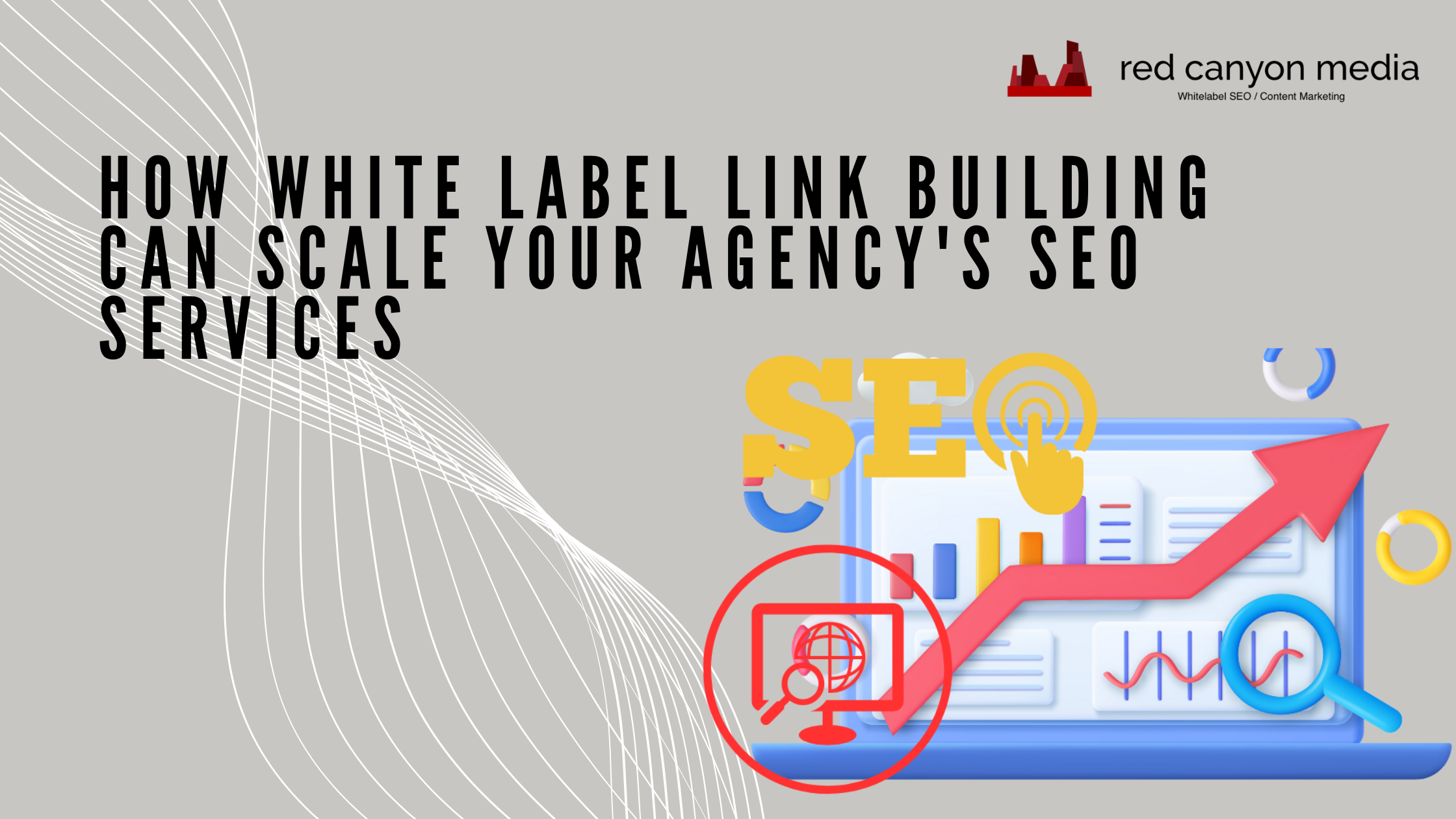Partner Resources
White Label Link Building - Success Guide
In today’s competitive digital landscape, acquiring high-quality backlinks is essential for improving search engine rankings and driving organic traffic. However, building these links requires expertise, time, and resources that many agencies may not possess in-house. This is where white-label link building services come into play, offering a seamless solution to enhance your clients’ SEO performance under your own brand.
TABLE OF CONTENTS
What Are Backlinks?
Backlinks are inbound links from external websites that lead to your site. Search engines view these links as signals of credibility and trust, which can enhance your website’s authority and improve its rankings in search results. High-quality backlinks from reputable sources can significantly boost your SEO performance, driving more organic traffic to your site.
What is White Label Link Building?
White label link building is a strategic SEO solution where a digital marketing agency partners with a specialized provider to build high-quality backlinks on behalf of their clients. This service allows the agency to enhance its clients’ SEO performance while maintaining full credit for the work.
How Does White Label Link Building Work?
- Identifying the Need for Backlinks – A digital marketing agency determines that a client requires stronger backlinks to boost search rankings and organic visibility. This may be a client request or a proactive SEO strategy.
- Partnering with a White Label Provider – The agency collaborates with a professional link-building service that specializes in securing authoritative backlinks. The terms, scope, and strategy are discussed in detail.
- Executing the Link Building Strategy – The white label provider acquires high-quality backlinks through ethical SEO techniques such as guest posting, outreach campaigns, broken link building, and digital PR.
- Delivering Results Under the Agency’s Brand – The provider supplies unbranded reports and data, allowing the agency to present the results as their own to the client.
Why Agencies Choose White Label Link Building
- Lack of In-House Expertise – Link building is a specialized process that requires industry knowledge, outreach skills, and access to authoritative websites. Many agencies prefer outsourcing rather than hiring a dedicated team.
- Expanding Service Offerings – Agencies can offer professional link-building services without investing in training or additional resources.
- Cost & Time Efficiency – White label link building provides a scalable and cost-effective way to improve clients’ SEO without stretching internal resources.
Why Are SEO Backlinks Important?
- They Build Authority – Search engines consider backlinks as a measure of a website’s reliability. When reputable sites link to your content, it reinforces your authority and improves your chances of ranking higher in search results.
- They Drive Organic Traffic – A well-placed backlink on a high-traffic website can bring new visitors to your site, increasing exposure and potential customer engagement.
- They Improve Search Rankings – Backlinks help search engines determine the relevance and popularity of your content. The more high-quality backlinks you earn, the better your chances of securing a top position in search results.
For Red Canyon, securing high-quality backlinks is a key part of an effective SEO strategy, ensuring long-term online growth and visibility.
Is White Label Link Building Right for You?
Deciding whether to outsource link building depends on your agency’s needs, resources, and growth goals. White label link building allows you to leverage expert services under your own brand. You might benefit from this approach if:
- Your Agency Lacks In-House Expertise – If your team doesn’t specialize in link building, partnering with a white label provider ensures you can still offer high-quality services without hiring additional staff.
- You Have More Client Demand Than Capacity – When client requests exceed your resources, outsourcing helps you maintain efficiency and deliver results without compromising quality.
- You Want to Expand Your Services – Adding link building to your offerings allows you to attract more clients without the overhead of building an internal team.
- You Need Advanced Link Building Techniques – Professional link-building providers have experience with specialized strategies, such as guest posting, digital PR, and broken link building, giving your clients a competitive edge.
White label link building can be a powerful solution for agencies looking to scale their SEO services efficiently while maintaining a strong reputation.
Advantages of White Label Link Building
White label link building provides businesses with a cost-effective and efficient way to strengthen their SEO strategy while maintaining focus on their core services. By partnering with a specialized provider, you can enhance your offerings, boost client satisfaction, and grow your revenue—all without the need to build an in-house link-building team. Here are four key benefits of using white label link building:
- Efficiency and Scalability
With white label link building, you gain access to a team of experts who already have the tools, strategies, and industry connections needed to secure high-quality backlinks. This allows you to scale your services without increasing overhead costs, making it a cost-effective way to expand your SEO capabilities. - Specialized Expertise
Link building requires in-depth knowledge and time-consuming outreach efforts. By outsourcing to experienced professionals, you can offer a high-quality service without having to invest in training or resources, giving your clients the competitive edge they need. - Better Client Results
High-quality backlinks contribute to improved keyword rankings, greater online visibility, and increased organic traffic. By delivering effective link-building solutions, you help your clients achieve long-term SEO success while strengthening trust and credibility in your agency. - Revenue Growth Opportunities
Expanding your services with white label link building enables you to generate additional revenue without the risks and expenses of developing an in-house team. It also creates opportunities to upsell SEO packages and attract new clients looking for comprehensive digital marketing solutions.
Types of SEO Backlinks
There are 11 different types of SEO backlinks a website can receive, intentionally or unintentionally – some beneficial and others potentially harmful.
1. DoFollow Backlinks
DoFollow backlinks allow search engines to follow the link to its destination, passing authority and contributing to the linked page’s ranking. These are among the most valuable backlinks for SEO, as they serve as endorsements from reputable sites. Acquiring DoFollow backlinks from authoritative and relevant sources enhances a website’s visibility and credibility.
2. NoFollow Backlinks
NoFollow backlinks contain an HTML attribute that instructs search engines not to follow the link, limiting their direct impact on search rankings. Despite their reduced SEO influence, NoFollow backlinks can drive referral traffic and contribute to a natural backlink profile.
3. Affiliate Backlinks
Affiliate backlinks originate from affiliate marketing programs, where businesses reward affiliates for driving traffic or sales via tracked links. Although these links often include a NoFollow attribute, they can generate valuable traffic and brand awareness when managed effectively.
4. User-Generated Content (UGC) Backlinks
UGC backlinks are links generated by users through comments, forums, or reviews. While they can indicate organic engagement, they require moderation to prevent spam and maintain content quality. Websites should monitor UGC backlinks to ensure they align with SEO best practices.
5. Sponsored or Paid Backlinks
These backlinks are acquired through financial transactions, where websites or influencers are paid to include links. To comply with search engine guidelines, they should be disclosed and often tagged with NoFollow attributes. While they can increase visibility, over-reliance on paid links is not recommended.
6. Editorially Placed Backlinks
Editorial backlinks are naturally earned when other websites find content valuable and link to it voluntarily. These links are among the most effective for SEO, as they indicate credibility and authority. Producing high-quality, informative content increases the likelihood of obtaining editorial backlinks.
7. Toxic Backlinks
Toxic backlinks come from spammy or unethical sources and can harm a website’s SEO. Regular backlink audits using tools like Moz Link Explorer or SEMrush help identify and disavow these harmful links to maintain a clean backlink profile.
8. Text SEO Backlinks
These backlinks are embedded within textual content, providing contextual relevance to search engines. The anchor text used in these links is crucial, as it should be natural and keyword-optimized to maximize SEO benefits.
9. Image SEO Backlinks
Image SEO backlinks occur when other websites use images from a source and link back to it. Optimizing image alt text with relevant keywords enhances the SEO value of these backlinks. Unique and high-quality images increase the chances of earning backlinks.
10. Frame SEO Backlinks
Frame backlinks involve embedding content from one website into another via HTML frames or iframes. These backlinks are generally not recommended, as search engines may struggle to attribute content correctly, leading to minimal SEO benefits.
11. Form SEO Backlinks
Form backlinks are generated through online forms, such as directory submissions or community profile links. While they can contribute to link-building, overuse of low-quality form submissions may negatively impact SEO. Ensuring relevance and credibility in form backlinks is essential.
A balanced backlink profile that includes a mix of DoFollow, NoFollow, editorial, and other high-quality links is key to effective SEO. Regular monitoring and ethical link-building strategies help improve search rankings while avoiding penalties from search engines.
How to Choose the Right White Label Link Building Agency
Selecting the right white label link building agency is crucial for enhancing your website’s authority and search engine rankings. Here’s what to consider when making your choice:
- Proven Industry Experience and Reputation – Look for an agency with a track record of delivering successful link-building campaigns. Request case studies, client testimonials, and tangible results that showcase their expertise.
- Ethical White-Hat Link Building Strategies – Ensure the agency follows white-hat SEO practices. Unethical or spammy link-building tactics can result in penalties from search engines.
- Transparent Link Building Process – A reputable agency will provide insight into their strategy, including the types of links they build and the sources they use. While they may not disclose every detail, complete secrecy can be a red flag.
- Strong Communication and Collaboration – Open communication is key to a successful partnership. The right agency will be responsive, proactive, and willing to collaborate with your business to achieve your SEO goals.
Red Flags to Avoid
- Promises of instant rankings or guaranteed results.
- Reliance on black-hat or low-quality link-building techniques like bulk directory submissions or paid links.
- Lack of transparency about their process, link sources, or reporting.
- Poor communication or hesitation to address your questions and concerns.
FAQs
About
White Label Link Building
1. How Many Backlinks Are Needed to Rank?
The number of backlinks required to rank depends on keyword competition. High-difficulty keywords demand more high-quality backlinks, while lower competition keywords need fewer. To estimate backlink requirements:
- Use tools like Ahrefs’ Keyword Explorer to analyze keyword difficulty and recommended backlink count.
- Check competitor backlink profiles to understand what’s necessary to achieve top rankings.
2. How to Acquire Backlinks from Wikipedia?
Securing backlinks from Wikipedia requires contributing valuable, well-referenced content aligned with Wikipedia’s guidelines. To increase your chances:
- Provide factual, high-quality information backed by authoritative sources.
- Avoid promotional language or direct link placement.
- Engage with the Wikipedia community and make meaningful contributions before adding external references.
3. What’s the Difference Between Backlinks and Referring Domains?
- Backlinks – Individual links pointing to your website.
- Referring Domains – Unique websites providing those backlinks.
A strong backlink profile includes links from multiple reputable referring domains, rather than multiple links from the same site.
4. How is Backlink Authority Measured?
Backlink authority is evaluated through metrics such as:
- Domain Rating (Ahrefs)
- Domain Authority (Moz)
- Authority Score (Semrush)
These scores assess the credibility and influence of a linking website, impacting its effectiveness in SEO rankings.
5. Should You Sell Backlinks on Your Website?
Selling backlinks is against search engine guidelines and can result in penalties that harm your site’s credibility. Instead, focus on organic link-building strategies to maintain a strong and ethical SEO profile.


